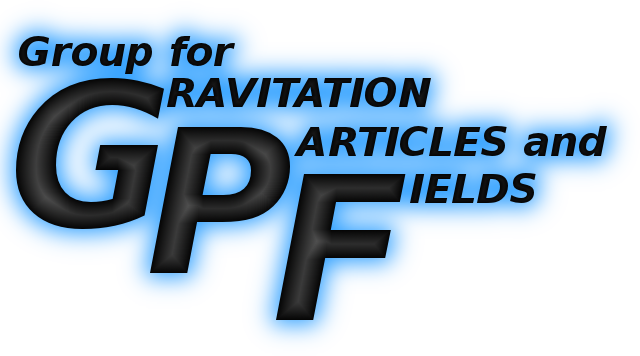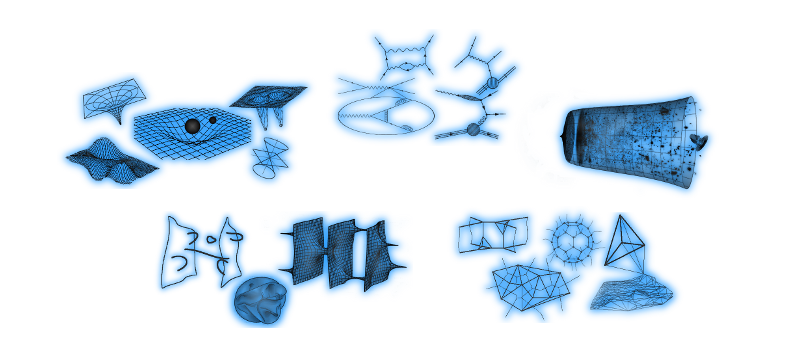


2023 Workshop on Gravity, Holography, Strings and Noncommutative Geometry
3. February 2023, Belgrade, Serbia
Organization
The Workshop is organized by Group for Gravitation, Particles and Fields (Institute of Physics and Faculty of Physics, University of Belgrade), supported by the Ministry of Science, Technological Development and Innovations, Republic of Serbia, and by the project "Quantum gravity from higher gauge theory (QGHG-2021)" from the program IDEAS of the Science Fund of Republic of Serbia.
Scientific committee
Dr. Branislav Cvetković and Dr. Marko Vojinović
Registration
Registration is now closed.
Workshop photos
The photos of the workshop can be found here.
Programme
Lectures were held on Friday, 3. February 2023, at the Faculty of Physics, seminar room 665, third floor.
|
09:50 -- 10:00 --- Opening |
Introduction and opening of the workshop | |
|
10:00 -- 10:50 --- Lecture 10:50 -- 11:00 --- Discussion |
Speaker: Rodrigo Olea (lecture slides) |
Title: Conformal renormalization and energy functionals in AdS gravity Abstract: Within a holographic framework, we explore the physical consequences of embedding Einstein-AdS gravity in Conformal Gravity in four and six dimensions. In the bulk, the procedure is equivalent to Holographic Renormalization, as the Einstein-AdS action appears augmented by the correct boundary counterterms. In codimension-2 surfaces, 4D Conformal Gravity induces a conformal invariant which, for given conditions on the ambient space and the surface itself, reproduces different functionals: Renormalized Area, Willmore energy and Reduced Hawking Mass. |
|
11:00 -- 11:50 --- Lecture 11:50 -- 12:00 --- Discussion |
Speaker: Olivera Mišković (lecture slides) |
Title: Symmetries of gauge theories in the light front Abstract: We use Hamiltonian formalism to explore asymptotic symmetries emerging at the null boundary of four-dimensional gauge theories in the flat space. We discover a new kind of a symmetry generator, additional to the usual large gauge transformations, that acts only on the boundary fields. The improved generators close a generalized Kac-Moody algebra with a non-trivial central extension. We work out in detail the cases of electromagnetism and Yang-Mills theory. |
|
12:00 -- 12:20 --- Break |
Coffee break | |
|
12:20 -- 13:10 --- Lecture 13:10 -- 13:20 --- Discussion |
Speaker: Gabriel Arenas-Henriquez (lecture slides) |
Title: Accelerating black holes in 2+1 dimensions Abstract: In this talk we will study accelerating systems in 2+1 AdS gravity. Starting from a general ansatz we are able to construct three classes of geometries which can be interpreted by studying their physical parameters. From these, we construct stationary, accelerating point particles; one-parameter extensions of the BTZ family resembling an accelerating black hole; and find new solutions including a novel "accelerating BTZ geometry" not continuously connected to the BTZ black hole as well as some black funnel solutions. If time allows it, we will comment on their thermodynamic description and a new way of interpreting these black holes holographically via fluid/gravity correspondence. |
|
13:20 -- 15:30 --- Lunch |
Lunch break | |
|
15:30 -- 15:55 --- Lecture 15:55 -- 16:00 --- Discussion |
Speaker: Tijana Radenković (lecture slides) |
Title: Topological invariant of 4-manifolds based on a 3-group Abstract: We study a generalization of a 4-dimensional BF-theory in the context of higher gauge theory. Starting from the notion of Lie 3-groups, we generalize the integral picture of gauge theory to a 3-gauge theory that involves curves, surfaces, and volumes labeled with elements of non-Abelian groups. We define the discrete state sum model of topological higher gauge theory based on the classical 3BF action for a general 3-group in dimension d = 4. The obtained state sum coincides with Porter's TQFT for d=4 and n=3, and it is a generalization of the state sum based on the classical 2BF action with the underlying 2-group structure constructed by Girelli, Pfeiffer, and Popescu. In order to verify that the constructed state sum is a topological invariant of the underlying 4-dimensional manifold, its behavior under Pachner moves is analyzed. A sketch of the proof that the state sum is invariant under the Pachner moves and thus independent of the chosen triangulation will be presented. |
|
16:00 -- 16:25 --- Lecture 16:25 -- 16:30 --- Discussion |
Speaker: Dušan Đorđević (lecture slides) |
Title: Randall-Sundrum braneworld and holography for 5D Chern-Simons gravity Abstract: Randall-Sundrum braneworld models have been studied in various contexts for more than 20 years. They are closely related to holography, as they use an AdS space-time in D dimensions to describe a physics induced on a codimension-one brane. This talk will consider the Randall-Sundrum model using holographic techniques, starting from the five-dimensional Chern-Simons gravity with an SO(4,2) gauge group. Then, we will discuss the induced gravity theory (coupled with a cutoff CFT) and analyse the equations of motion. Finally, we will comment on the possible solutions to those equations. |
|
16:30 -- 16:50 --- Break |
Coffee break | |
|
16:50 -- 17:15 --- Lecture 17:15 -- 17:20 --- Discussion |
Speaker: Danilo Rakonjac (lecture slides) |
Title: Entropy of extremal black holes in Poincare gauge theory: the case of rotating black hole Abstract: In this talk, we will explore the problem of calculating the entropy of extremal black holes in Poincaré gauge theory. The extremal black holes evade the approach based on the Hamiltonian formalism and using the first law of black hole mechanics, where the equation from which we calculate entropy turns out to be an identity. Therefore, we are taking another route using the correspondence between the near horizon geometries of extremal black holes and conformal field theories living on their boundary. The case of Kerr solution is explored in detail as an example of the procedures, and if time allows, other solutions will be commented on as well. |
|
17:20 -- 17:45 --- Lecture 17:45 -- 17:50 --- Discussion |
Speaker: Marko Vojinović (lecture slides) |
Title: A note on the equivalence principle in general relativity and Yang-Mills theories Abstract: The role and the importance of the equivalence principle (EP) in Einstein's theory of gravity is very well known. It is less known, however, that EP can be generalized in a straightforward manner to other interactions. Namely, just as EP prescribes the way gravity couples to matter, a statement analogous to EP prescribes the way electromagnetism couples to matter (fermions and scalars). Moreover, the same even applies to non-Abelian gauge fields --- a generalized EP prescribes how Yang-Mills fields couple to fermions and scalars. In this talk, we will explicitly demonstrate all these generalizations of EP and argue that interactions with matter, both in general relativity and in the Standard Model, are all prescribed essentially by the same principle. Talk based on arXiv:2210.00133. |
|
17:50 -- 18:00 --- Closing |
Final discussion and closing | |
List of participants
Last update: Tuesday 28. March 2023, 00:55:39.